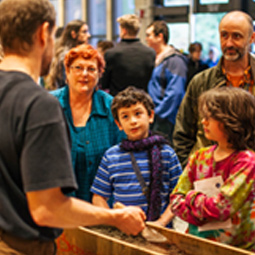NAGPRA — U.S.
As required by this law, the Burke Museum provided NAGPRA Summaries to the National Park Service and relevant Tribal communities in 1993, and NAGPRA Inventories of human remains and funerary objects in 1995. The museum has updated NAGPRA Summaries, Inventories and Notices since the passage of the law, in compliance with the Future Applicability final rule and the new regulations implemented in January 2024. Completed repatriations under NAGPRA can be viewed in the US Federal Register, using “Burke Museum” as a search term.
Non-U.S. Repatriations
All ancestral human remains and cultural items are treated with respect and care. The Museum considers repatriation to Indigenous communities or relevant government entities on a case-by-case basis. We collaborate with our State Attorney General to develop and refine our International Repatriation Policy, so we can respectfully return ancestral human remains and cultural belongings.
Completed Repatriations
A summary of completed repatriations is listed below (as of April 2024; updated annually):
U.S. NAGPRA:*
Ancestral human remains:** 573
Funerary objects: 24,799
Sacred objects: 8
Objects of cultural patrimony: 8
Non-U.S.*
Ancestral human remains:
Canada: 4
Peru: 3
Philippines: 2
Non-Native: 2
Funerary objects:
Peru:1
*In some cases, legal transfer is completed but the Burke continues to hold items or ancestors in trust while Tribes make reburial arrangements.
**All ancestral human remains held at the Burke from the U.S. have been identified as Native American, and are therefore subject to NAGPRA.
Welcoming Repatriations
Our repatriation work is ongoing and is guided by both legal obligations and our institutional ethics. Consultation with Tribal Nations and international communities is a thoughtful process that offers opportunities and long-term relationships.
The list below indicates geographic areas with identified ancestors and funerary belongings affiliated with Tribal Nations in the U.S that are awaiting repatriation from the Burke. This list (updated annually) also includes identified ancestors from other Nations. We invite further consultation about their care and access. The Burke Heritage departments also care for cultural belongings from around the world which may include sacred objects, funerary objects, and objects of cultural patrimony that have yet to be identified. If you would like to know more about which cultural belongings are housed at the Burke, we encourage you to reach out to repatriation@uw.edu.
Heritage Collections | U.S.
U.S. Ancestral Human Remains (in consultation):
Alaska
Oregon
Washington
Southwest
U.S. Identified Funerary Objects:
Alaska
California
Idaho
Oregon
Tennessee
Florida
Illinois
Mississippi
North Dakota
Washington
Wisconsin
Heritage Collections | International
Ancestral Human Remains by Nation:
Argentina
Canada (British Columbia) Egypt
Indonesia
Mexico
Peru
Philippines
Russia (Siberia)
Solomon Islands
Spain Thailand
Tibet
Funerary Objects by Nation:
Canada (British Columbia)
China
Learn more about our work
KUOW Soundside podcast | February 8, 2024
Burke Museum | February 20, 2017
UW Perspectives | October 11, 2001
Land Acknowledgement
The Burke Museum stands on the lands of the Coast Salish Peoples, whose ancestors have resided here since time immemorial. Many Indigenous peoples thrive in this place — alive and strong.

